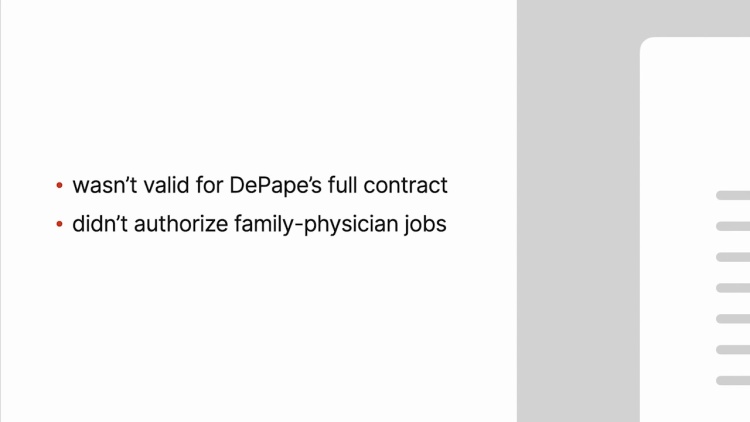DePape v. Trinity Health Systems, Inc.
United States District Court for the Northern District of Iowa
242 F. Supp. 2d 585 (2003)

- Written by Carolyn Strutton, JD
Facts
Gregory dePape (plaintiff) was a Canadian citizen who had completed his medical training and licensing in Canada. Trinity Health Systems, Inc. (Trinity) (defendant), recruited dePape, who signed a five-year contract to work as a physician in Iowa. Trinity retained the law firm of Blumenfeld, Kaplan & Sandweiss (Blumenfeld) to manage dePape’s immigration process. To obtain a visa to work in the United States, dePape had to take a specific medical-licensing exam; however, dePape did not take this exam because he erroneously believed the process would take two years to complete. When Blumenfeld learned dePape had not taken the exam, it failed to inform him that he could complete the process in just a few months and that if he did not take it, he would be unable to legally practice medicine in the United States. Instead, Blumenfeld began fraudulently preparing another type of visa, which did not permit dePape to work as a physician and which was valid for a shorter period than his contract with Trinity. Blumenfeld concocted another job title for a temporary position but did not inform Trinity or dePape about these complications. dePape resigned from his job in Canada, ended his lease, shipped his belongings to Iowa, and traveled to the border. Once there, Blumenfeld’s agent showed dePape the fraudulent visa and advised dePape to lie to immigration officials about his position and the length of his stay. dePape was shocked and outraged but believed the process was legal. However, when questioned by immigration officials, dePape revealed the visa’s misrepresentations and was denied entry. A Trinity representative advised dePape to attempt to enter the United States as a visitor and then travel to Iowa to work out another approach to his immigration status. Upon doing so, immigration officials recognized dePape and escorted him back to Canada. dePape sued Blumenfeld and Trinity for damages related to his inability to begin his job in the United States. The court dismissed dePape’s claims against Trinity.
Rule of Law
Issue
Holding and Reasoning (Bennett, C.J.)
What to do next…
Here's why 907,000 law students have relied on our case briefs:
- Written by law professors and practitioners, not other law students. 47,100 briefs, keyed to 996 casebooks. Top-notch customer support.
- The right amount of information, includes the facts, issues, rule of law, holding and reasoning, and any concurrences and dissents.
- Access in your classes, works on your mobile and tablet. Massive library of related video lessons and high quality multiple-choice questions.
- Easy to use, uniform format for every case brief. Written in plain English, not in legalese. Our briefs summarize and simplify; they don’t just repeat the court’s language.







